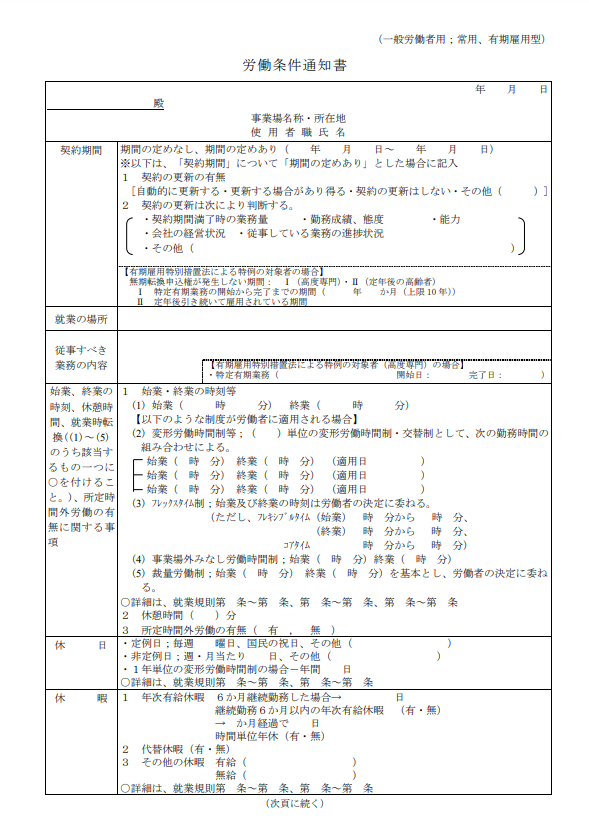Adulting can be difficult, and working as an employee can be confusing, along with all the excitement and thrill of a new job. That makes us realise that we do not really know much about labor laws. This is even more true when working in a country that is not a familiar place. So, as a lawyer myself, I decided to gather all my knowledge to make work life in Japan easier for you.
Understanding the Basics of Labor Laws

What is labor law, and how does it help me?
In short, labor laws safeguard employed persons. Your employer can be punished in case they exploit you at work.

What are Labor Laws?
The labor law in Japan is a body of laws and regulations that govern the relationships between workers, employers, and labor unions. It covers various aspects of employment, such as hiring and firing practices, working conditions, wages, hours, benefits, and dispute resolution. Some of the laws that comprise labor laws in Japan include the Labor Standards Act, the Industrial Safety and Health Act, and the Trade Union Act.
A “worker” protected by labor law includes everyone who works for hire, regardless of their nationalities, and not only regular employees but also part-time workers are protected by labor law.
Why Do Labor Laws Matter?
Labor Laws limit the content of agreements between employers and workers, and so they are a major exception to the freedom of contract (the principle that anyone can decide their contract in any way they want). Then, why are such exceptions made?
In the legal world, we usually hypothesise a world where all humans possess sufficient knowledge, and are able to act, negotiate, and defend themselves to maximise their own interest. However, in labor cases, oftentimes workers are in a weak position, and do not have other options than to accept contracts that exploit them. For example, the factory workers in the UK in the era of Industrial Revolution were forced to work 10 – 16 hours a day, 6 days a week. If we let the contents of employment contracts be free, workers’ rights would end up being too weak. Therefore, labor laws have modified the freedom of contract principle, and set force workers’ rights, such as holidays and minimum wages, that can never be taken away.
It is important to know these laws if you work as an employee. Without knowing those rules, you wouldn’t know their violations even when your employers are taking advantage of you.
Your Rights as an Employee

Then, what kind of rights do I have?
You have varieties of it! Here are major protections that the laws stipulate.

Minimum Wage
Minimum wage is a system that defines the minimum amount of wages that employers must pay workers. Minimum wages are determined by the Minimum Wage Law. If an employment contract set force a lower wage than the minimum wage, the wage term is invalid and the contract is deemed to stipulate according to the Minimum Wage Law. In addition, if an employer fails to pay wages above the Minimum Wage, the employer is required to pay the difference to the worker and penalties apply.
The Minimum Wage Law applies to all workers, including part-time workers and foreign workers.
There are two types of minimum wages: regional minimum wages, which are set by prefecture, and industry-specific minimum wages, which are set for workers in specific industries.
In conclusion, employers are subject to penalties if they allow workers to work for less than the minimum wage amount. If you ever think if you are underpaid, check the Minimum Wage applicable to you here.
Legal Working Hours and Break Time
Daily working hours must not exceed 8 hours, and weekly working hours must not exceed 40 hours (Section 32 of the Labor Standards Act [LSA]). Certain types of companies can apply exception to the Legal Working Hours, which can exceed 40 hours and allow more flexiblity (“modified working schedule system,” or 変形労働時間).
Also, employees are guaranteed the following resting hours under the section 34 of the LSA:
- at least 60 minutes for more than 8 hours’ work a day, or
- at least 45 minutes for more than 6 hours’ work a day.
Overtime Laws
Upper limits
Although overtime work is everywhere in practice, it is actually an exceptional working style based on strict restrictions. Overtime work is only allowed if a special agreement is executed by the labor union or employee representatives and an employer. That agreement is called “Section 36 agreement”, based on its legal basis.
The amount of allowed overtime work is up to 45 hours a month, and 360 hours a year. If an employer has a special reason for requiring more worktime, then the law requires a further special clause to be agreed upon. Even when they agreed on it, the absolute upper limit is set as below. The employer will be punished if they worked their employees over this amount of time.
- 720 hours a year
- 100 hours a month
- less than 80 hours of overtime working hours in the course of 2 months to 6 months
- You can work for more than 45 hours in a month, but the numbers of such months cannot exceed 6 months in a year.
Overtime payment
Employees are entitled to overtime premium for any overtime work:
- 25% for overtime work
- 35% for work in holidays
- 25% for night work*
- 50% for more than 60 hours in a month
*Night work is defined as work between 10 pm to 5 am.
For example, if one works after 10 pm and the total overtime working hours exceeds 60 hours within the same month, they will be paid 175% (100% + 25% for night work + 50% for more than 60 hours/month) of their standard salary for that night’s work hours.
You might have heard the term [サービス残業/ saa-bisu zan-gyo], which means “Service overtime work.” It is illegal when an employer doesn’t pay the overtime premium. If your employer is reluctant to pay the overtime fee, you can consult with the Labor Standards Office and have them investigate your employer for punishment. You can also recover the unpaid overtime premium, along with its interests from the date it should be paid to you.
Legal Requirements for Day Off
You are also entitled to paid leave, according to the duration of your service at the company. The principle is that the more you work, the more paid off days you will get.
The number of paid leave days
When a full-time employee worked for the same company for consecutive 6 months, and they actually worked more than 80% of work days, they will be bestowed 10 days of paid leave days a year. The amount of paid leave will gradually increase if they don’t quit the job and satisfied the 80% rule (up to 20 days a year).
| Consecutive working months | 6 mo | 18 mo | 30 mo | 42 mo | 54 mo | 66 mo | 78 mo |
| Days of Paid Leave per Year | 10 | 11 | 12 | 14 | 16 | 18 | 20 |
Part-timers also have the right to paid leave, but the numbers of days they receive is proportionate to their standard work days. For example, when they work more than 5 days or 30 hours a week, they will have the same days as full-timers. If they work fewer days, then they will get reduced days of paid leave.
How to take your days off

I requested a day off, and my boss asked a reason for it.
You don’t have to give a reason. It is not required to take paid leave. They are asking just because it is not prohibited.

Employees can take the entitled paid leave days whenever they want, regardless of the reasons. However, there’s one limitation regarding the timing: employer can refuse the requested date and offer another date if it interferes with the normal operation of business (The employer’s right to change the date is called “時季変更権” [jiki-henkou-ken] ).

What if I don’t use up all the days? Will they expire?
It rolls over to the next year. Pay attention to the expiration date.

The unused days can be accumulated until the next year of its bestowment. However, any paid leave days that haven’t been used for more than 2 years will be extinguished by the statute of limitations, so be alert of expiration date so as not to waste them.
Right to Know the Contents of Your Contract
In order to check if your employer is respecting your rights, first you need to know the contents of your employment contract. For example, you need to know your Standard Work Hours for calculating the amount of the salary you should be paid, because without it, you can’t determine whether you’ve worked “overtime” or not. Thus, you should keep your labor contract in a safe place.

I got my offer orally, and my contract hasn’t been documented. Is there any way to access it?
Yes, there is! The labor laws stipulates multiple rights to access your contract terms.

In some cases where employment contract is entered into orally, employers are reluctant to provide contents of contract and try to take advantage of it. For such cases, employers are obliged to take certain actions to ensure that employees have access to their employment contract.
The Obligation to Provide the Written Working Conditions (the Section 15 of LSA)
The employers should provide the document detailing the contents of your labor contract (what we call “Working Conditions”), in the below format, which includes following topics:

- The terms (i.e. time period) of employment
- The conditions on the renewal of the term, if the contract has a certain period of term. (e.g. if there is a possibility of renewal, and the criteria for renewal)
- Workplaces and description of work
- Standard work hours and holidays (e.g. the beginning and ending time of work hours, whether there will be overtime work or not, break hours, and holidays)
- How the salary will be paid (e.g. how to decide the amount, payment method, the closing and payment date)
- Rules about retirement (including firing)
This applies to all employees, including part-time workers. Non-compliance to this may lead to the penalty fee up to 300,000 yen for employers. If there is any discrepancy in the working conditions, the worker may demand to follow the working conditions, or immediately terminate the labor contract (c.f. standard termination needs 14 days) (section 15 of LSA).
Check your Working Conditions Document to see if your employer is fully compliant.

The obligation to display Rules of Employment
Certain important documents, such as the common rules for all employees and the agreements between labor union and employers, need to be either displayed or distributed to employees so that they can access them at any time. (the Section 106 of LSA)
Among the documents that should be displayed, the most important one is the Rules of Employment. It stipulates the common rules in the workplace, and should cover the following topics (the Section 89 of LSA):
- the beginning and ending time of work hours
- break hours, holidays, and vacations
- rules about salary
- rules about quitting the job

My boss is going to change the Rules of Employment to decrease my salary without my consent! Is there any way I can oppose it?
Yes, there is! Rules on salary form part of your Working Conditions, which require your consent to change it. However, there are exceptions, so let’s take a closer look.

Employees needs to be consulted before implementing any changes to it. (the section 90 of the LSA) Also, Employer cannot apply changes to the Rules of Employment that results in the unfavorable change of the Working Conditions without employee’s consent (the section 9 of Labor Contract Law). However, there is an exception to it: employer can apply such change to the Rules of Employment if such change: i) is reasonable, and ii) is made known to all employees (the section 10 of LCA).
In practice, the definition of “reasonable” is limited, and in the case of employee consent, the consent must be “substantial,” so the chance of such changes be permitted is limited. A high court (in 協愛事件) decided that simply not objecting doesn’t constitute substantial consent, and the Supreme Court ruled that the existence of consent should be determined carefully. (Source: 就業規則による労働条件の変更 (only in Japanese))
What if Your Employer Violates Labor Laws?
In case your employer doesn’t pay for your overtime, refuse paid holidays, or even fire you without any rationale, what can you do? There are various options to deal with such situation, and some of them are as follows. For non-Japanese speaking expats, the most convenient way is to call the consultation service that he Japanese Government has set up for foreigners at here. This service is run by an administrative organization whose mandate is to protect workers’ rights, so you can consult them worrylessly.
Consult with the Labor Standards Inspection Office
The Labor Standards Inspection Office is your go-to place when you encounter any problems in work settings. It is an governmental body and has the responsibility for enforcing labor laws, and they have the power to investigate, supervise, and punish employers for violations of labor laws.
Use Dispute Resolution Systems
Several official dispute resolution systems are available to help resolve disputes between employees and employers, such as Labor Abitration and Conflict Resolution Service provided by the Prefectual Labor Bureau.
Key Terms & Definitions
- Working conditions [労働条件 Rou-dou-jyou-ken]: The content of labor contract, including duration of labor contract, place of work, starting and working hours, wages, etc.
- Rules of Employment [就業規則 Syu-gyou Kisoku]: Rules that regulate working conditions, workplace disciplines, and other practical rules shared by other workers in the same workplace. Details about holidays and how to take them are usually specified in the rules of employment. Companies that employ more than 10 people are required to establish rules of employment. (Article 89 of the Labor Standards Act)
- Overtime Work [残業 Zan-gyo]: Work performed beyond the legal working hours.
- Overtime Pay [残業代 Zan-gyo Dai/割増賃金 Wari-mashi Chin-gin]: Additional wages paid to workers for overtime work.
- Statutory Holidays: Workers are guaranteed at least one regular holiday per week, or four or more days of regular holidays per four weeks. This is called statutory holidays. (Article 35 of the Labor Standards Act).
- Paid Leave [有休 Yu-kyu]: Leave that allows workers to receive wages even when they take a day off work other than statutory holidays.
- Maternity Leave [産休 San-kyu]: Leave taken by a female employee due to childbirth. The employee will be partially compensated their wage for 50-67% by the social security system.
- Childcare Leave [育休 Iku-kyu]: Leave taken by an employee to care for a child. The employee will be compensated the same amount as maternity leave.
- Labor Standards Act (LSA) [労働基準法 Rodou-kijyun-hou]: One of the most important labor law that regulates minimum standards for employment.
- Labor Contract Act (LCA) [労働契約法 Roudou-keiyaku-hou]
- Labor Standards Inspection Office [労基署 Rou-ki sho]: The governmental agency responsible for enforcing labor laws in Japan.
- Regular Employee [正社員 Sei Sya-in]: An employee with a permanent employment contract.Other type of employee is a part-timers. Different rules and regulations may apply to them, such as paid holiday rules (details follow).


